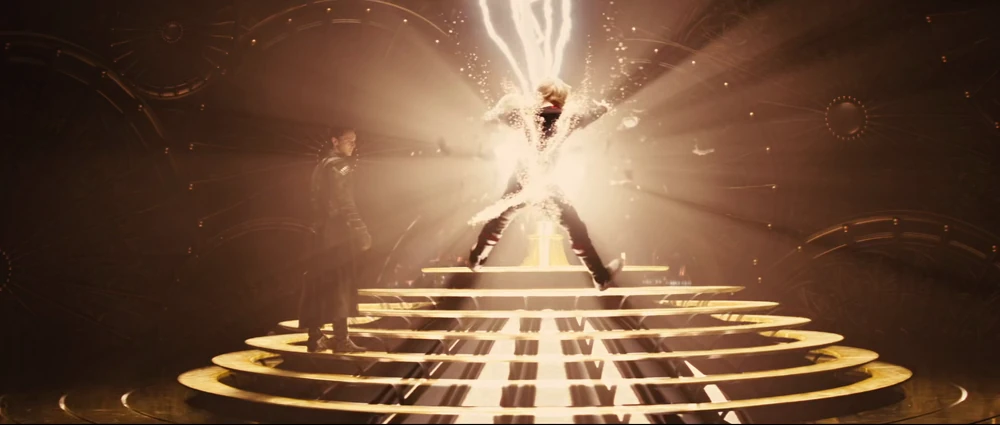Loki & Thor Are More Similar Than We Could Have Ever Hoped For & Here’s Why

Thor and Loki shared a brotherly upbringing, yet their bond wasn’t tied by blood, explaining why Thor might have considered Loki mischievous. Despite Loki’s reputation as the most mischievous among the Asgardian gods, the ‘Loki’ series portrays a changed individual. In season 2, Loki reflects on Thor, hinting that they may not have been as different as perceived. What commonalities unite Thor and Loki?
Loki recalls Thor’s banishment to Earth- Something he plotted personally
In the fourth episode of ‘Loki’ Season 2, the TVA faced major challenges, particularly with the Temporal Loom on the brink of emitting destructive radiation capable of wiping out the entire organization. To tackle this, Loki and Mobius sought the assistance of Victor Timely, relying on his Temporal Aura and inventive skills. Sylvie’s decision in episode 3 to spare Timely allowed this collaboration.
The trio—Loki, Sylvie, and Mobius—enabled OB and Timely to work on the Throughput Multiplier, a potential solution to the Temporal Loom crisis. While waiting for progress, Mobius suggested a pie break, but Sylvie snapped, disapproving of such indulgence when the fate of the TVA hung in the balance.
Sylvie found herself in the same spot where Loki and Mobius had shared pie earlier. Loki, attempting to address Sylvie’s earlier outburst, steered the conversation toward his brother, Thor. He recounted Thor’s banishment from Asgard, transformation on Earth, and return as a changed person. Loki perceived Thor’s newfound kindness as a weakness, believing that softness led to death.

Thor, though not evil, demonstrated a willingness to sacrifice lives for his goals, notably in the first ‘Thor’ film when he sought to eliminate the Frost Giants. Banished to Earth, Thor’s encounter with Jane Foster provided him with a human perspective. Returning to Asgard, he clashed with Loki, who aimed to destroy the Frost Giants.
Throughout their MCU journey, Thor embodied softness, while Loki remained mischievous and conniving. This dynamic persisted until Loki’s death in the Sacred Timeline, where he attempted one final act of mischief before succumbing to Thanos.
Loki finally started seeing value in human life
So, while Loki initially perceived his brother as a big softy, he underwent significant personal growth. In the first season of ‘Loki,’ Mobius played a crucial role in shaping Loki’s character. By revealing the consequences of his actions in the Sacred Timeline, including the harm and deaths he caused, Mobius guided the god of mischief toward a newfound purpose.
This purpose centered on protecting the timeline, even if he couldn’t prevent it from branching. Loki aimed to safeguard the TVA to prepare for the looming threat posed by various variants of He Who Remains across the multiverse.
In essence, Loki came to realize that Thor’s softness wasn’t a weakness but a wellspring of strength that fueled a noble purpose—protecting others. This revelation showcased that, despite their perceived differences, Loki and Thor shared a commonality. Loki also evolved into a softer individual, understanding that it wasn’t a weakness but a path to atonement for past mistakes.

This insight was what Loki tried to impart to Sylvie. He wanted her to comprehend that sparing Victor Timely wasn’t an act of weakness but a compassionate choice that could save countless lives in the multiverse.
Convincing Sylvie proved challenging, given her years of survival-focused mentality, where softness equated to vulnerability and death. Her past experiences made it understandable why she held such beliefs, having spent years evading the TVA to stay alive.
Nevertheless, Sylvie’s internal struggle revealed her inherent goodness, as something within her prevented her from choosing to kill Timely. This mirrored Loki’s own journey, showcasing that they both valued the lives of others, aligning Sylvie with Loki’s evolving resemblance to Thor in their shared appreciation for life.
Have something to add? Let us know in the comments below!
Liked this article? Follow us on Facebook, Threads, and X to stay updated with the latest news.

